|
|
|
Sort Order |
|
|
|
Items / Page
|
|
|
|
|
|
|
| Srl | Item |
| 1 |
ID:
186335
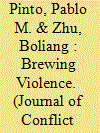

|
|
|
|
|
| Summary/Abstract |
Two prominent features in current world affairs are the unprecedented level of global economic integration and the growing incidence of intrastate violence. We develop and test a novel argument linking global integration through foreign investment to intrastate armed conflict. The presence of multinational corporations in developing countries can cause market concentration, resulting in high rents. Disputes between governments and would-be challengers over the appropriation of these rents are likely to turn violent, increasing the incidence of armed conflict. State capacity mitigates this positive association between foreign investment and intrastate war. Strong states have the capacity to deter rebellions, address citizens’ demands through institutionalized mechanisms, and credibly commit to the peaceful resolution of conflicts. Using data from developing countries for over four decades and addressing potential endogeneity and selection biases, we find strong support for our hypotheses. Our findings have important implications for understanding the link between economic interdependence and conflict.
|
|
|
|
|
|
|
|
|
|
|
|
|
|
|
|
| 2 |
ID:
061851


|
|
|
| 3 |
ID:
126548


|
|
|
|
|
| Publication |
2013.
|
| Summary/Abstract |
Political scientists have examined how domestic politics and the competition for international capital affect the setting of national tax rates. In this paper, I explore how political institutions, specifically the level of democracy, affect firm-level taxation across the world. I argue that electoral competition leads democratic governments to higher levels of taxation of firms. Using a data set on firm tax payments on the foreign affiliates of US multinational corporations from the US Bureau of Economic Analysis, I show that there are large variations within countries on the tax burdens faced by firms that are not explained by national tax rates. I find evidence that the mobility of the specific investment project, the types of spillovers these investments provide to a community, and attributes of the parent firm are all important determinants of taxation. While firm-level factors clearly affect corporate taxation, I argue that democratic institutions limit the offering of tax incentives and generate electoral benefits to policing tax avoidance by multinational corporations. After controlling for parent firm and foreign affiliate-level factors, I find that democratic countries generate as much as 26% more tax revenues from multinational corporations relative to authoritarian countries.
|
|
|
|
|
|
|
|
|
|
|
|
|
|
|
|
| 4 |
ID:
137188
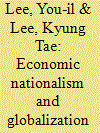

|
|
|
|
|
| Summary/Abstract |
In this article we explore whether South Korea's long-standing tradition of economic nationalism remains an appropriate development strategy, or whether this approach has been rendered irrelevant by the current wave of neoliberal globalization led by multinational corporations. We examine the changed economic agendas of each Korean regime, with a particular focus on national identity and economic nationalism, mobilized and implemented by the state. We argue that, despite the rapid development of globalization and cosmopolitanism in South Korea, economic nationalism is still prevalent. Korea's adoption of neoliberal economic activities, such as lifting trade barriers to encourage the inflow of foreign direct investment, was necessary to assist certain areas of the economy. Furthermore, changing the direction of the growth trajectory remains subordinate to the goal of state building. Empirical analysis of results collected from survey data and one-on-one interviews conducted in 2010 help to validate our hypothesis.
|
|
|
|
|
|
|
|
|
|
|
|
|
|
|
|
| 5 |
ID:
189008
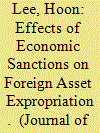

|
|
|
|
|
| Summary/Abstract |
Studies suggest that home countries impose economic sanctions following host state expropriation of home firms. However, and not addressed in the empirical literature, is the possibility that sanctions lead targeted countries to nationalize firms from sender countries. Using bilateral expropriation data from 1985 to 2010, and controlling for endogeneity issues, we find that sanctions significantly increase expropriation risk, encouraging targeted states to inflict pain in a reciprocal manner on sender countries. Expropriations also enable targeted nations to acquire economic assets from foreign firms, undermining the restricting goals of sanctioning states, and provide opportunities for leaders to show political resolve at home by standing up to senders. Our results are robust using monadic or dyadic data and different statistical methods, indicating another sanction-busting strategy used by targeted countries.
|
|
|
|
|
|
|
|
|
|
|
|
|
|
|
|
| 6 |
ID:
178573
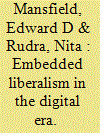

|
|
|
|
|
| Summary/Abstract |
In recent years, the volume and intensity of attacks on globalization have been steadily rising. It is frequently argued that the antiglobalization backlash stems from strains that have been placed on the compromise of embedded liberalism. We argue that existing research underemphasizes how technological change and the digital revolution have contributed to these strains. Global value chains facilitated by the digital revolution have linked technology in advanced industrial countries to low-cost labor in developing countries, precipitating distributional losses for low-skilled labor in the industrial world. Further, the digital revolution has led to regulatory challenges involving both capital and labor. We argue that, as a result, governments face both mounting opposition to globalization and heightened difficulty in supporting the programs and policies necessary to buffer the adverse domestic effects of globalization and maintain support for embedded liberalism.
|
|
|
|
|
|
|
|
|
|
|
|
|
|
|
|
| 7 |
ID:
164380
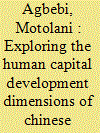

|
|
|
|
|
| Summary/Abstract |
This article uses a case-study approach to discuss the effects of Chinese economic engagement on three dimensions of human capital development: local employment, training and skill building, and knowledge and technology transfer. The study findings suggests that Chinese economic engagement can and does contribute to human capital development in Africa; however, this is dependent on certain sectoral factors and contextual conditions. This study advances a working hypothesis that the human capital development impact of Chinese economic engagement will vary across countries and sectors of the African economy. This working hypothesis seeks to guide further research towards developing a theoretical framework for the study of Chinese economic engagement in Africa and its effects on human capital development. The article also identifies research areas that should be further explored in order to gain a deeper understanding of the impact of Chinese economic engagement in Africa.
|
|
|
|
|
|
|
|
|
|
|
|
|
|
|
|
| 8 |
ID:
074013
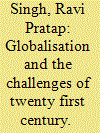

|
|
|
| 9 |
ID:
069544
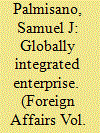

|
|
|
| 10 |
ID:
074059


|
|
|
| 11 |
ID:
121830
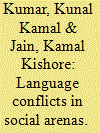

|
|
|
|
|
| Publication |
2013.
|
| Summary/Abstract |
This paper argues that our understanding of the issues related to language conflicts inside business organizations would be enriched by close analysis of the conflicts that take place in the larger arena of the social sphere, of which the business organizations are a part. Taking clues from earlier studies, the paper argues that the prime reason behind linguistic conflicts is the fear of loss of linguistic identity by the linguistic minorities. It is further debated that the same factors related to the loss of linguistic identity would play a role in the business arena as well where the official language of the workplace puts its native speakers in an undue advantageous position with respect to other members who have learnt the official language as their second language.
|
|
|
|
|
|
|
|
|
|
|
|
|
|
|
|
| 12 |
ID:
091956


|
|
|
|
|
| Publication |
2009.
|
| Summary/Abstract |
The spread of the forces of globalization have significantly affected the modern world. Thus, in this article, I attempt to identify how globalization has negatively influenced development of tertiary or higher educational policies in underdeveloped countries. Using the case study of India, I observe that the liberalization of the Indian economy resulted in a large inflow of foreign direct investment which in turn influenced the emergence of a new higher education policy, in order to meet the manpower requirements of multinational corporations. Such a policy has increased social dissatisfaction within the society due to the dichotomy between the needs and wants of the citizens, resulting in growth of social conflict.
|
|
|
|
|
|
|
|
|
|
|
|
|
|
|
|
| 13 |
ID:
132029
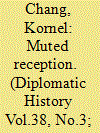

|
|
|
|
|
| Publication |
2014.
|
| Summary/Abstract |
During the Second World War, the United States developed a propaganda apparatus to counter fascist propaganda in Mexico, and later, in Latin America more broadly. Mobilizing the resources and expertise of Hollywood, multinational corporations, and the social sciences, the United States attempted to gauge and sway Mexican popular opinion. This concerted effort at mass persuasion marked the first time that the United States attempted to systematically shape inter-American relations by influencing popular public opinion directly. But this project to inculcate the Mexican masses with U.S. propaganda was marred by difficulties and mishaps that hindered and distorted its transmission. On the other side, Mexicans contested, negotiated, and resisted these overtures, indicating that the influence of U.S. propaganda was neither irresistible nor straightforward. This is a story, then, about U.S. wartime propaganda, how it was developed on the ground and its muted reception in Mexico.
|
|
|
|
|
|
|
|
|
|
|
|
|
|
|
|
| 14 |
ID:
120471


|
|
|
|
|
| Publication |
2013.
|
| Summary/Abstract |
According to opponents of 'neoliberal globalisation' located in the postcolonial realm, multinational corporations are central agents in a structure of global hegemonic rule that leaves little or no space for the postcolonial subject to determine his/her own fate. This argument is contested by a number of scholars, who point out that presupposing a lack of agency on the side of subaltern is yet another way of silencing him/her. But how can his/her 'true' voice be recognised without at the same time disguising existing domination? In this article, it will be argued that one possibility is the development of a different theoretical framework that challenges the taken-for-granted assumption on which the dilemma is based: the existence of the subject and its conscious voice. For this purpose, the article will use Gilles Deleuze's theory of the various expressions and struggles of life. With the help of the analysis of a particular case, Monsanto's introduction of genetically modified cotton into India in 2002, the article will suggest that the multinational company (Monsanto) should not be regarded as yet another neo-colonial oppressor. Instead, it is a war machine that unleashes flows enabling nomadic life assemblages to counter-attack.
|
|
|
|
|
|
|
|
|
|
|
|
|
|
|
|
| 15 |
ID:
191908
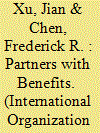

|
|
|
|
|
| Summary/Abstract |
Scholars often assume that courts in authoritarian regimes cannot credibly protect foreign investors’ interests because these institutions lack judicial independence. In this article, we construct a novel data set on multinational corporations’ litigation activities in Chinese courts from 2002 to 2017. This supports the first systematic case-level analysis of foreign firms’ lawsuit outcomes in an authoritarian judiciary. We find that foreign companies frequently engage in litigation in authoritarian courts. Moreover, we theoretically and empirically distinguish between two types of government–business ties in terms of their effectiveness in incentivizing the host state to protect foreign investors’ interests. We argue that ad hoc, personal political connections deliver only trivial lawsuit success for multinational enterprises, while formal corporate partnerships with regime insiders can lead the state to structurally internalize foreign investors’ interests. In particular, we demonstrate that joint venture partnerships with state-owned enterprises help foreign firms obtain more substantial monetary compensation than other types of multinational enterprises. By contrast, the personal political connections of foreign firms’ board members do not foster meaningful judicial favoritism. These findings are robust to tests of alternative implications, matching procedures, and subsample robustness checks. This article advances our understanding of multinational corporations’ political risk in host countries, government–business relations, and authoritarian judicial institutions.
|
|
|
|
|
|
|
|
|
|
|
|
|
|
|
|
| 16 |
ID:
185521
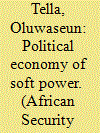

|
|
|
|
|
| Summary/Abstract |
In recent times, the concept of soft power has emerged as one of the most important terms in international relations. It has been applied to various aspects of statecraft from democracy promotion to peace-making, cultural diplomacy, economic diplomacy, counter-terrorism and disaster management, to name but a few. However, there is a dearth of literature on the political economy of soft power. Given that economic interests substantially drive states’ foreign policies, it is surprising that this aspect of states’ power of attraction has been neglected. It is against this backdrop that this article examines the political economy of soft power focusing on South Africa. In doing so, it engages South Africa’s neo-liberal order and the influx of its multinational companies in Africa and submits that despite the criticism it encounters in this regard, Pretoria has exercised soft power within the purview of political economy.
|
|
|
|
|
|
|
|
|
|
|
|
|
|
|
|
| 17 |
ID:
179866


|
|
|
|
|
| Summary/Abstract |
Multinational firms operate in multiple national jurisdictions, making them difficult for any one government to regulate. For this reason the firms themselves are often in charge of their own regulation, increasingly in conjunction with international organizations by way of public-private governance initiatives. Prior research has claimed that such initiatives are too weak to meaningfully change firms’ behavior. Can public-private governance initiatives help firms self-regulate, even if they lack strong monitoring or enforcement mechanisms? I take two steps toward answering this question. First, I introduce a new measure of firms’ performance on ESG (environmental, social, and governance) issues: the extent to which the firms issue public responses to claims of misconduct from civil society actors. Second, I argue that public-private governance initiatives allow firms to benefit from the legitimacy of their public partners, lowering the reputational cost of transparent response. Employing novel data on firm responses to human rights allegations from the Business and Human Rights Resource Center, I find that membership in the largest and most prominent initiative, the United Nations Global Compact, significantly increases firms’ propensity to respond transparently to stakeholder allegations. These results suggest a limited but important role for public-private initiatives in global governance.
|
|
|
|
|
|
|
|
|
|
|
|
|
|
|
|
| 18 |
ID:
060151
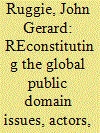

|
|
|
| 19 |
ID:
133359
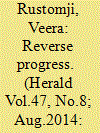

|
|
|
|
|
| Publication |
2014.
|
| Summary/Abstract |
Water thus extracted is not mineral water or sweet water but zero water or raw water in local lingo. It is treated through various kinds of purification processes distillation, ozonation ultraviolet light etc.
|
|
|
|
|
|
|
|
|
|
|
|
|
|
|
|
| 20 |
ID:
139277


|
|
|
|
|
| Summary/Abstract |
This article explores the linkage between foreign direct investment, grand corruption (that is, state capture) and innovation in Russia's regions in between 1997 and 2010. The results indicate that during the period under investigation both foreign direct investment and state capture were the significant determinants of innovation outcome. What is also interesting is that a positive impact of state capture on innovation through foreign firms, and a negative impact-through exporting-was observed.
|
|
|
|
|
|
|
|
|
|
|
|
|
|
|
|
|
|
|
|
|